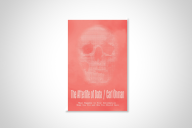You have /5 articles left.
Sign up for a free account or log in.
Prestige has its privileges. When a well-established award is announced -- as the 100th set of Pulitzer Prize winners was on Tuesday -- it tends to consume the available limelight. Anything less monumental tends to disappear into its shadow.
But a couple of developments in the humanities this week strike me as being as newsworthy as the Pulitzers. If anything, they are possibly more consequential in the long run.
For one, we have the Whiting Foundation’s new Public Engagement Fellowship, which named its first recipients on Tuesday. The fellowship ought not to be confused with the Whiting Award, which since 1985 has been given annually to 10 authors “based on early accomplishment and the promise of great work to come.” The winners receive $50,000 each, along with, presumably, the professed esteem and subdued malice of their peers.
By contrast, the Public Engagement Fellowships go to professors who have shown “a demonstrated commitment to using their scholarly expertise to reach wider audiences,” in order to fund ambitious projects designed to have direct and significant impact on a specific public outside the academy.” There are eight scholars in the fellowship’s inaugural cohort, including, for instance, Zoë Kontes, an associate professor of classics at Kenyon College, who will spend a semester creating a podcast to explore the black market in looted artifacts.
As with the literary prize, the fellowship comes with $50,000, with $10,000 earmarked for the project’s expenses and the rest covering the recipient’s stipend. Neither the number of fellows nor the apportionment of finances is set in stone, as I learned from Daniel Reid, the foundation’s executive director, when we met last week.
He explained that after more than 40 years of funding dissertations in the humanities at elite universities, the Whiting Foundation had decided it was time to direct its attention to a relatively underserved aspect of humanities scholarship: the cultivation of new ways of making connections with the world beyond the campus. Last year, the foundation contacted administrators at 40 universities, encouraging them to nominate faculty with projects that might be appropriate for funding.
“This has been a learning process on both sides,” Reid said, “for [the foundation] in running things and for the institutions in getting a sense of what we’re looking for.” He explained that the proposals were then evaluated by a group of seven people who had considerable experience with the communication of specialized knowledge to a wide public. The names are not public, though Reid indicates that a number of them are prominent figures in scholarship, publishing and museum or gallery curation. (The need for secrecy is understandable: publicizing the names would leave the Whiting judges as vulnerable as delegates to this summer’s political conventions are starting to feel.)
For the second group of Public Engagement Fellows, the Whiting Foundation will double the number of colleges and universities it contacts in search of nominations, with the long-term goal of making the process open to all higher education institutions. In the future, the number of recipients may range from six to 10. I gave the example of Kontes’s podcast on the looting of antiquities as an example (not quite at random: consider me on the waiting list to subscribe) but hope the other projects stimulate interest, discussion and perhaps some healthy competition.
The other development from earlier in the week is Duke University Press’s announcement that it will be publishing an edition of the works of Stuart Hall, who can -- without exaggeration, if not without argument -- be called the founding father of cultural studies as an academic discipline, at least in Great Britain. The Wikipedia entry for Hall is surprisingly thorough, so anyone for whom the name does not signify might want get up to speed there.
Hall is the case of a figure in the humanities whose impact is both widely recognized yet difficult to assess for an American -- for the simple reason that, even at the peak of his influence, his work was remarkably difficult to find. A number of his major writings seem to have been published as mimeographed papers. He published books, but not that many found their way into American bookstores. So the prospect of having his scattered and fugitive writings in an edition from a major university press is appealing.
I heard that Ken Wissoker, the press's editorial director, might have some background information on why we are getting Hall’s work in this form only now, two years after his death. He confirmed my impression in an email note and gave a little background that seems worth putting into the record: “David Morley had edited two or three volumes of Stuart’s essays for Macmillan U.K. back in the late ’80s, but my understanding is that Stuart decided against having them come out (or delayed it into not happening). The original cultural studies essays were in a lot of different places …. Xeroxes and then PDFs circulated, but it would have been very difficult to track down all the originals …. Stuart saw the work as conjunctural and didn’t want it becoming scripture. Ironically, this was only a problem in English. There are translations to Mandarin and German (and I believe Spanish and/or Portuguese).”
The first of the two titles in the Duke edition will be out this fall, and the second will be published next spring. One is a set of lectures on the intellectual foundations of cultural studies, the other the first volume of Hall’s autobiography. “The memoir will have a second volume,” Wissoker says, “that will be more of an intellectual and political summation ‘what I think now’ book.” Farther down the line there will be a volume of selected essays, and Laura Sell, Duke's publicity and advertising manager, says that a number of thematically organized collections on “politics, race, photography, black aesthetics, Marxism and post-Marxism, [and] the Caribbean” will come in due course.








